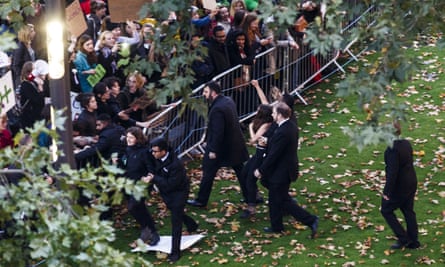More than a hundred feminist protesters jumped the barriers onto the red carpet at the premiere of Suffragette in Leicester Square. Women were seen being physically carried and pushed back over barriers as green and purple smoke bombs filled the air outside the Odeon cinema in central London on Wednesday.
Activists from Sisters Uncut, who campaign against domestic violence, attended the red carpet event saying they wanted to bring attention to the cuts to domestic violence services and declaring “the battle isn’t over yet”.
Helena Bonham Carter, one of the stars of the film, was seen to mouth “Oh golly” as the protesters jumped the barrier as she was walking the red carpet. Undeterred she continued signing fans posters and posing for photographs. Interviewed by Sky News at the premiere, Bonham Carter said: “I’m glad our film has done something. That’s exactly what it’s there for,” adding that the protest was the “perfect” response to the film.

The actor Romala Garai, who also stars in the film, was giving interviews as the protest broke around her. She said: “I haven’t spoken to them [the protesters] or seen their demands but I’m happy to see the suffrage movement is alive and happening.”
New mother Carey Mulligan, who plays aspiring suffragette Maud Watts, said: “Hopefully this film will inspire everyone in the way they view the world. We are an unbalanced society – women and men – and films like this inspire conversations about how we can correct that imbalance.”
Anne Marie Duff, who has a young son, has also been educating her child about gender equality. She explained: “We are all the same. It doesn’t matter what bits of flesh we have – we are all equal. And if we have the same skills we should be paid equally for them.”

Presenter Lauren Laverne was forced to raise her voice to interview the directors on camera in front of the cinema as the activists chanted “Dead women can’t vote” and “We are suffragettes”. The premiere was running at least 15 minutes behind schedule as police joined the fray and extra barriers were brought in.
Janelle Brown, from Sisters Uncut said: “We believe that all women facing domestic violence should be able to access support and safety. Clearly the government do not share this belief, as they are removing funding for life-saving support services.”
Shantha Masters, a support worker from a specialist refuge group for women of south Asian origin, said: “I am here because I am angry about cuts to specialist services. But I am also here to represent – to show that all women of all backgrounds have rights and if they are not met we will take action until they are.”
Domestic violence survivor and Sisters Uncut activist Angie Johnson said: “My life was saved by specialist services and we must fight every step of the way to make sure all women can access them.”
Latifa, who did not give her surname, added: “The struggle for women’s liberation isn’t over. At a time when two women a week are killed by violent men in the UK, we need to keep fighting because dead women can’t vote. This in the context of austerity. Access for women to social housing, benefits and legal aid have all been reduced and women are dying.

“These cuts disproportionately affect women of colour. Of the 32 services for women affected by domestic violence that have been closed since 2010, they were all specialist services which helped LGBTQ and BAME women.
“It’s timely because the cast of the film is entirely white and they are running with this slogan, ‘I’d rather be a rebel than a slave’ which implies passivity or acceptance of being a slave. But it also ignores the fact that women of colour were completely involved in the suffragette struggle. This film isn’t representing them.”
Asked why the protesters chose to target a film seemingly supportive of their feminist stance, Latifa said: “This film is talking about women’s liberation in a very celebratory sense and there’s this argument that we’re in a post-feminist era so that means that our messages more than ever need to heard because there is this delusional element to it all.”
Suffragette opened the BFI London Film Festival, which runs until October 18. The film is released in the UK on 12 October
Comments (…)
Sign in or create your Guardian account to join the discussion